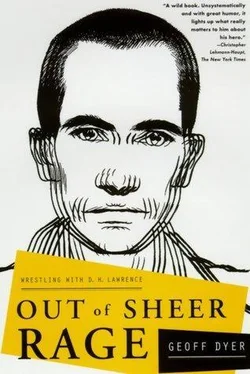A destiny is not something that awaits us, it is something we have to achieve in the midst of innumerable circumstantial impediments and detours. A character in A Question of Geography by John Berger and Nella Bielski expresses this concisely:
Each one of us comes into the world with her or his unique possibility — which is like an aim, or, if you wish, almost like a law. The job of our lives is to become — day by day, year by year, more conscious of that aim so that it can at last be realised.
I would quibble with that ‘at last’: a destiny is not what is finally achieved but the act of incrementally nudging towards it. This reservation aside, Berger and Bielski express a manifesto of destiny. Precisely because of its manifold uncertainties and contradictions, Lawrence’s life shows what this involves on the most practical level imaginable: which buses to take, to where, for how long. .
‘Basically it’s none of our business how somebody manages to grow,’ wrote Rilke, ‘if only he does grow, if only we’re on the trail of our own growth.’ But it is quite possible that what one imagines to be the trail of one’s growth is actually the path of one’s diminution. It can be your destiny, in other words, not to live up to your destiny, to fall short of it, to end up in Dullford.
Needless to say I made no progress with my study of Lawrence after moving to Dullford: I was too busy DIYing. I went at it with a vengeance, painting so furiously that I even had a Kafkaesque dream: that my hands had been transformed into a pair of giant rollers.
I say I made no progress but, in the same way that Rilke wondered if our most idle days might not be our most productive, I wonder if these days spent DIYing might not have been crucial to my work on Lawrence. Lawrence as DIYer might yet turn out to be a major theme of this study. When my agent wrote to see if I was making any progress I simply copied out, by way of reply, a letter Lawrence sent to his publisher. ‘Naturally I don’t write when I slave building the house — my arms feel so heavy, like a navvy’s, though they look as thin as ever.’ My sentiments, my arms, exactly. The difference is that Lawrence was a great DIYer, perhaps the first great DIYer in English literature. ‘I have painted windowframes by the mile, doors by the acre, painted a chest of drawers till it turned into a bureau, and am not through by a long chalk.’ And not just painting. ‘Lawrence was always busy,’ Frieda’s third husband, Angelo Ravagli, remembered, ‘mostly doing housework.’ When he was not building sheds and cupboards, putting up shelves and repairing outhouses he was doing ‘the washing, cooking, floor-cleaning and everything’: making home, in short. Once again I am struck by unexpected felicity, by how appropriate it was that I should have been drawn to Ikea on my way to Eastwood: a prime example, it now seems, of the detour as straight line. Lawrence the prophet of sexual revolution means almost nothing to us, to me, today; what I love is Lawrence the handyman. The perfect photo of Lawrence, the one that best expresses what he means to us now, on the brink of the millennium, would be one showing him hammer in hand, building an Ikea kitchen at the ranch in New Mexico.
If only I liked doing things like that. I love the idea of home improvement but the reality of it is that I am hopeless at it, hate it in fact. The truth is that I have now been to Ikea. Laura and I drove to the one in west London and had an hour of intensive therapy with a kitchen-planning consultant who persuaded us that if we read the instructions carefully and were patient then we could build our own kitchen. Laura was dubious, I was eager, and so we lugged back our selection of flat-packs and got stuck into it the very next day. Two days later we had partially (mis)assembled one unit and our dream kitchen lay stacked up in the living room awaiting the arrival of professional fitters. It was an absurdly ambitious project and so we went for something easier: putting up a cork notice-board. All my life I had dreamed of owning a cork notice-board. For years, having a cork notice-board on which one pinned bills, postcards and concert tickets was the very symbol of a settled life. And when we moved to Dullford I bought one! Putting it up promised to be a simple business except nothing is simple in DIY: the drill went haywire and gouged a crater in the plaster. Already angry I moved a couple of inches to the left and made a neat hole that plunged — BANG! — straight into the electric cable. Complete blackout. Plus I had a terrible shock, namely that I didn’t get any kind of electric shock (some kind of insulation in the drill, I suppose) and, in this disoriented state of shocked unshockedness, took a screwdriver to the notice-board and slashed it to ribbons.
I blame my father. DIYing is all about measuring, checking and re-checking; it’s about patience and precision, and I have none because my father emphasised all these things to me at such an early age that he took all the fun out of DIYing. To put the fun back into it I go at it hammer and tongs and the results are disastrous and not much fun. And still I love the idea of it, love those cathedrals of our self-help era, the home improvement superstores, I mean, especially Do It All where the PR booms out updates on special discounts, each bulletin ending with the assurance that ‘Together We Can Do It All’. And it works, this home-owners’ call to prayer. You hear and you believe. You have faith. Only when you get back to the home you want to improve do you find that, alone, you can do nothing.
Together, though, together with my father, it was possible to put up two hundred feet of bookshelves in my study. I measured the room, drew up the plans and, together, my father and I bought, transported and varnished the wood which was transformed into two hundred feet of shelving. My father did most of the measuring, a lot of the sawing and all the drilling. He made some mistakes in the measuring or the spirit-levelling and consequently some of the shelves were about an inch out of horizontal. He couldn’t account for it and I could see how it hurt and mystified him, that discrepancy. There was no explaining it, except to say he was losing it, losing his eye, his accuracy. To compensate he built some special wooden wedges so that the shelves ended up inch-perfect.
I’m looking at them now, those shelves which will probably turn out to be my father’s last great piece of DIY. At some time in the future — the hypothetical future, the one that will never come to pass because I hope to God I never have a child — my son will expect me to put up shelves for him. It is a biological law: the father builds shelves for his children. What I wonder, though, is where this ability to put up shelves is going to come from. When I was young I was always struck by the large manliness of my father’s hands. When, I asked myself, would my hands become like his? For the poet Michael Hofmann it started to happen in his late twenties:
By now, it is almost my father’s arm,
a man’s arm, that lifts the cigarettes to my mouth. .
Hofmann’s father was a writer so it is not surprising that the arm of his poet son should have turned out the same way. But for me, I think, it is never going to happen. My father’s hands and all the skills — drilling, sawing, building — that culminated in them have been left behind. From now on my hands will write the cheques that pay the kitchen-fitters, men with hands like my father’s, to build the things that he — like Lawrence — could make for himself and his son. It is not just a class you leave, it’s your biology too. Or maybe that’s not quite true.
‘ The photograph of father came today. It’s very nice: I see a good deal of myself in it .’ That was in January 1925, four months after Lawrence’s father had died. A few days ago my mother gave me a photograph of my father when he was in his mid-twenties. He is dressed in tennis whites, a blazer draped over his shoulders, racket in one hand. Only the blurred council house in the background — where his sister, my auntie Joan, still lives — insists that this is not an image from the long afternoon of the English leisured class. His hair — already thinning — is slicked back. Give or take a few years and details of fashion he looks as I do now: the same long legs, the same thin wrists, the same eyes and mouth. For the first time, I see myself in a picture of my father.
Читать дальше












